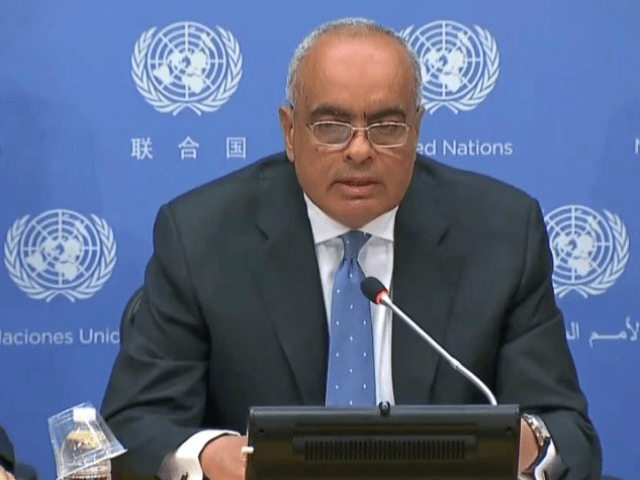UNITED NATIONS—The Egyptian Ambassador to the United Nations, speaking in his role as president of the Security Council, told reporters Wednesday that he does not see the crisis gripping Venezuela as a matter for the Council, as he claims it does not harm international peace and security.
Ambassador Amr Abdellatif Aboulatta, the Security Council president for the month of August, held a press conference to give reporters a sense of what the Council’s agenda would look like while Egypt held the presidency, which looks like it will not be paying too much attention to the crisis gripping Venezuela.
The socialist Latin American country has been in the spotlight for months, but particularly since Sunday, when President Nicolás Maduro held an election to create a parallel legislature known as the “Constituents’ Assembly,” a move that would allow him to go around the National Assembly. Many observers have called the vote fraudulent.
Since then, Maduro has intensified his crackdown on opposition leaders, re-arresting an opposition leader and a mayor previously granted house arrest for medical reasons early Tuesday. The nation once praised as a socialist paradise by left-wing commentators and politicians is now wracked by social unrest bordering on civil war, and mass food shortages leaving Venezuelans scavenging for food in the garbage. 125 people have been killed since April in the unrest alone.
While the Trump administration has slapped sanctions on Maduro and has called for more action at the U.N., the new Security Council president suggested it was not a matter of interest for arguably the most consequential body in the U.N.
“Until now I think of course there is some concern, but at the end of the day we see [the Venezuelan crisis] as internal affairs,” he said. “It does not harm peace and security right now from my point of view.”
Aboulatta added that if America or any other country requests Venezuela to be put on the agenda, then he will oblige. His dismissive approach to the crisis appears to be because the Council’s mandate is primarily to focus on issues to do with international peace and security, not with domestic security.
However, that mandate is frequently seen as more flexible, and considering the U.N.’s refugee body recently urged surrounding countries to be more welcoming to refugees—noting that applications from Venezuelans had “soared” in 2017 almost double the 27,000 that applied in the entirety of 2016—the crisis is arguably well within the Council’s mandate. The Venezuelan government’s ties to terrorist groups like the Revolutionary Armed Forces of Colombia (FARC) and Hezbollah also make any power grabs on its part a matter of global concern.
Aboulatta took a similarly dismissive approach to the Gulf crisis, where Saudi Arabia and its allies—including Aboulatta’s Egypt—have blockaded Qatar over its alleged funding of terrorism and its links to Iran.
When asked by a journalist what the Security Council would be doing with the crisis and how he would act, Aboulatta expressed confusion at the question. “What does the Security Council have to do with this rift between the Gulf countries?” he asked. “It has nothing to do with it.”
Aboulatta will hold the presidency until the end of the month, at which point it will transfer to the Ethiopian ambassador.
Adam Shaw is a Breitbart News politics reporter based in New York. Follow Adam on Twitter: @AdamShawNY

COMMENTS
Please let us know if you're having issues with commenting.